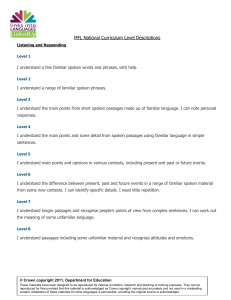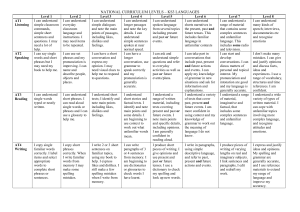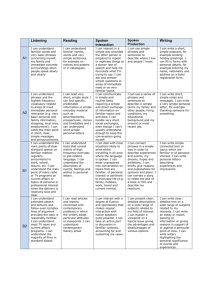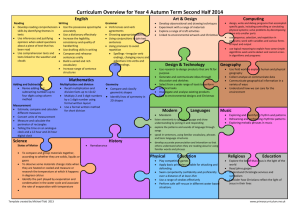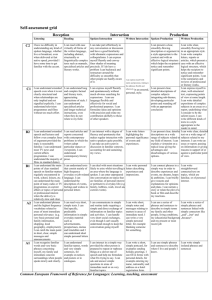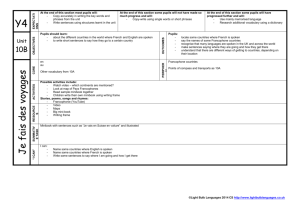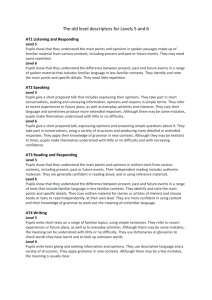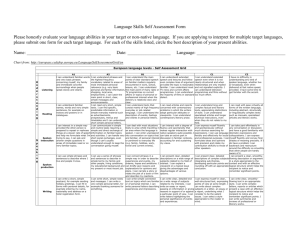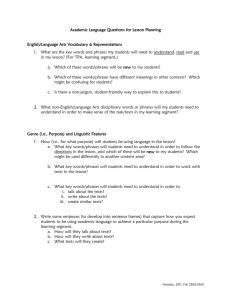KS3 National Curriculum Level Descriptors for Modern Foreign
advertisement
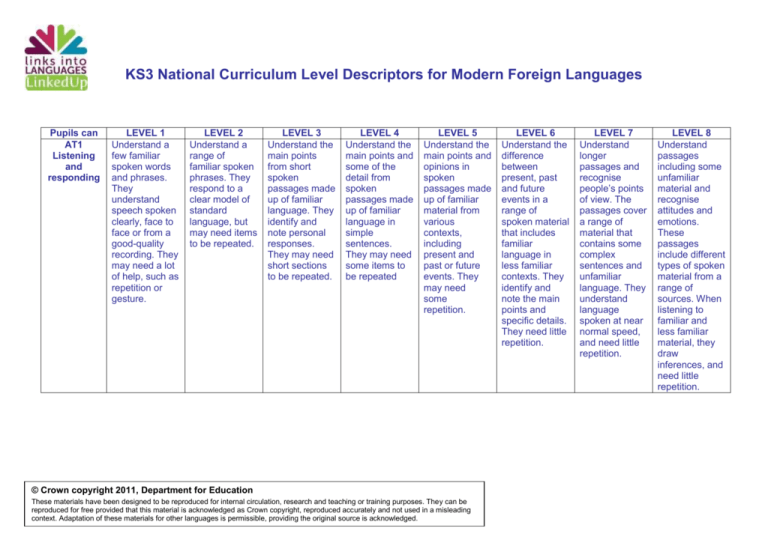
KS3 National Curriculum Level Descriptors for Modern Foreign Languages Pupils can AT1 Listening and responding LEVEL 1 Understand a few familiar spoken words and phrases. They understand speech spoken clearly, face to face or from a good-quality recording. They may need a lot of help, such as repetition or gesture. LEVEL 2 Understand a range of familiar spoken phrases. They respond to a clear model of standard language, but may need items to be repeated. LEVEL 3 Understand the main points from short spoken passages made up of familiar language. They identify and note personal responses. They may need short sections to be repeated. LEVEL 4 Understand the main points and some of the detail from spoken passages made up of familiar language in simple sentences. They may need some items to be repeated LEVEL 5 Understand the main points and opinions in spoken passages made up of familiar material from various contexts, including present and past or future events. They may need some repetition. © Crown copyright 2011, Department for Education These materials have been designed to be reproduced for internal circulation, research and teaching or training purposes. They can be reproduced for free provided that this material is acknowledged as Crown copyright, reproduced accurately and not used in a misleading context. Adaptation of these materials for other languages is permissible, providing the original source is acknowledged. LEVEL 6 Understand the difference between present, past and future events in a range of spoken material that includes familiar language in less familiar contexts. They identify and note the main points and specific details. They need little repetition. LEVEL 7 Understand longer passages and recognise people’s points of view. The passages cover a range of material that contains some complex sentences and unfamiliar language. They understand language spoken at near normal speed, and need little repetition. LEVEL 8 Understand passages including some unfamiliar material and recognise attitudes and emotions. These passages include different types of spoken material from a range of sources. When listening to familiar and less familiar material, they draw inferences, and need little repetition. KS3 National Curriculum Level Descriptors for Modern Foreign Languages Pupils can AT2 Speaking LEVEL 1 Say single words and short, simple phrases in response to what they see and hear. They may need considerable support from a spoken model and from visual clues. They imitate correct pronunciation with some success LEVEL 2 Answer simple questions and give basic information. They give short, simple responses to what they see and hear, and use set phrases. Their pronunciation shows an awareness of sound patterns and their meaning is clear. LEVEL 3 Ask and answer simple questions and talk about their interests. They take part in brief prepared tasks, using visual or other clues to help them initiate and respond. They use short phrases to express personal responses. Although they use mainly memorised language, they occasionally substitute items of vocabulary to vary questions or statements. LEVEL 4 Take part in simple conversations, supported by visual or other cues, and express their opinions. They begin to use their knowledge of grammar to adapt and substitute single words and phrases. Their pronunciation is generally accurate and they show some consistency in their intonation. LEVEL 5 Give a short prepared talk that includes expressing their opinions. They take part in short conversations, seeking and conveying information, opinions and reasons in simple terms. They refer to recent experiences or future plans, as well as everyday activities and interests. They vary their language and sometimes produce more extended responses. Although there may be some mistakes, pupils make themselves understood with little or no difficulty. © Crown copyright 2011, Department for Education. This resource has been created through the LinkedUp Award Scheme. LEVEL 6 Give a short prepared talk, expressing opinions and answering simple questions about it. They take part in conversations, using a variety of structures and producing more detailed or extended responses. They apply their knowledge of grammar in new contexts. Although they may be hesitant at times, pupils make themselves understood with little or no difficulty and with increasing confidence. LEVEL 7 Answer unprepared questions. They initiate and develop conversations and discuss matters of personal or topical interest. They improvise and paraphrase. Their pronunciation and intonation are good, and their language is usually accurate. LEVEL 8 Narrate events, tell a story or relate the plot of a book or film and give their opinions. They justify their opinions and discuss facts, ideas and experiences. They use a range of vocabulary, structures and time references. They adapt language to deal with unprepared situations. They speak confidently, with good pronunciation and intonation. Their language is largely accurate, with few mistakes of any significance. KS3 National Curriculum Level Descriptors for Modern Foreign Languages Pupils can AT3 Reading LEVEL 1 Recognise and read out a few familiar words and phrases presented in clear script in a familiar context. They may need visual clues. LEVEL 2 Show that they understand familiar written phrases. They match sound to print by reading aloud familiar words and phrases.They use books or glossaries to find out the meanings of new words. LEVEL 3 Show that they understand the main points and personal responses in short written texts in clear printed script made up of familiar language in simple sentences. They are beginning to read independently, selecting simple texts and using a bilingual dictionary or glossary to look up new words. LEVEL 4 Show that they understand the main points and some of the detail in short written texts from familiar contexts. When reading on their own, as well as using a bilingual dictionary or glossary, they begin to use context to work out the meaning of unfamiliar words. LEVEL 5 Show that they understand the main points and opinions in written texts from various contexts, including present, past or future events. Their independent reading includes authentic materials. They are generally confident in reading aloud, and in using reference materials. © Crown copyright 2011, Department for Education. This resource has been created through the LinkedUp Award Scheme. LEVEL 6 Show that they understand the difference between present, past and future events in a range of texts that include familiar language in less familiar contexts. They identify and note the main points and specific details. They scan written material for stories or articles of interest and choose books or texts to read independently, at their own level. They are more confident in using context and their knowledge of grammar to work out the meaning of unfamiliar language. LEVEL 7 Show that they understand longer texts and recognise people’s points of view. These texts cover a range of imaginative and factual material that contains some complex sentences and unfamiliar language. Pupils use new vocabulary and structures found in their reading to respond in speech or writing. They use reference materials when these are helpful. LEVEL 8 Show that they understand texts including some unfamiliar material and recognise attitudes and emotions. These texts cover a wide variety of types of written material, including unfamiliar topics and more complex language. When reading for personal interest and for information, pupils consult a range of reference sources where appropriate. KS3 National Curriculum Level Descriptors for Modern Foreign Languages Pupils can AT4 Writing LEVEL 1 Write or copy simple words or symbols correctly. They label items and select appropriate words to complete short phrases or sentences. LEVEL 2 Write one or two short sentences, following a model, and fill in the words on a simple form. They label items and write familiar short phrases correctly. When they write familiar words from memory, their spelling may be approximate. LEVEL 3 Write a few short sentences, with support, using expressions that they have already learnt. They express personal responses. They write short phrases from memory and their spelling is readily understandable. LEVEL 4 Write short texts on familiar topics, adapting language that they have already learnt. They draw largely on memorised language. They begin to use their knowledge of grammar to adapt and substitute individual words and set phrases. They begin to use dictionaries or glossaries to check words they have learnt. LEVEL 5 Write short texts on a range of familiar topics, using simple sentences. They refer to recent experiences or future plans, as well as to everyday activities. Although there may be some mistakes, the meaning can be understood with little or no difficulty. They use dictionaries or glossaries to check words they have learnt and to look up unknown words. © Crown copyright 2011, Department for Education. This resource has been created through the LinkedUp Award Scheme. LEVEL 6 Write texts giving and seeking information and opinions. They use descriptive language and a variety of structures. They apply grammar in new contexts. Although there may be a few mistakes, the meaning is usually clear. LEVEL 7 Write articles or stories of varying lengths, conveying opinions and points of view. They write about real and imaginary subjects and use an appropriate register. They link sentences and paragraphs, structure ideas and adapt previously learnt language for their own purposes. They edit and redraft their work, using reference sources to improve their accuracy, precision and variety of expression. LEVEL 8 Produce formal and informal texts in an appropriate style on familiar topics. They express and justify ideas, opinions or personal points of view and seek the views of others. They develop the content of what they have read, seen or heard. Their spelling and grammar are generally accurate. They use reference materials to extend their range of language and improve their accuracy.

